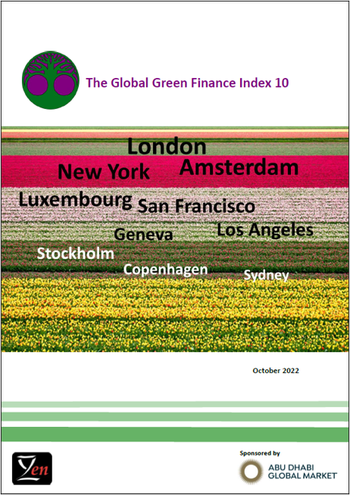Authors
Mike Wardle, Professor Michael Mainelli, Simon Mills
Published by
Long Finance & Financial Centre Futures (October 2022), 80 pages.
Share on social media:

The Global Green Finance Index 10 - Supplement "The Role Of The Financial Services Sector In Supporting Agriculture"
The tenth edition of the Global Green Finance Index (GGFI 10) was published on 27 October 2022. GGFI 10 provides evaluations of the green finance offerings of 84 major financial centres around the world. The GGFI serves as a valuable reference into the development of green finance for policy and investment decision-makers and is sponsored by Abu Dhabi Global Market.
As ESG analytics and other aspects of green finance penetrate mainstream financial activity, there is growing confidence in the development of green finance across all regions. There is, however, criticism of ESG as a mechanism, with commentary focusing on complexity, cost, greenwashing, and its low impact on carbon emissions. There is growing interest in carbon pricing and trading as a mechanism to address the central issue of greenhouse gas emissions and it may be that carbon pricing, alongside improved ESG systems, will be the way forward.
Looking at the centres which perform well in the GGFI, they are generally places that commit to environmental improvements across the economy as well as in finance. A key part of this performance relates to skills in the economy. Centres such as London, Amsterdam, and New York have a depth of skills in green finance, but also in other aspects of sustainable economic development.
Among those responding to the GGFI survey, Policy & Regulatory Frameworks continue to be identified as the leading driver in the development of green finance, underlining the reliance of green finance on robust and stable policy frameworks, which require government and regulatory action. Other leading drivers were Risk Management Frameworks, International Initiatives, and Academic Research around climate change.
As anticipated in the last edition of the GGFI, the invasion of Ukraine by the Russian Federation has led to a reduction in Moscow’s position in the index. In addition, the economic shock that has arisen from the war, has slowed down the transition away from fossil fuels in the short-term, although it may lead to increased investment in renewable energy.
In the supplement to this edition of the GGFI, we focus on agriculture, which is critical to the achievement of the sustainable development goals and faces challenges from climate change, political instability, and population growth. In the supplement, we consider the role different types of finance can play in supporting agricultural development.
Index Results
- London and Amsterdam maintained their first and second positions in GGFI 10, both improving their rating, but with New York gaining 27 points to move into third place. Sydney and Copenhagen moved into the top 10, displacing Zurich and Oslo.
- Western European centres take six of the top 10 places, with US centres taking three places and Sydney entering the top 10 for the first time.
- Seven Asia/Pacific centres feature in the top 20. There is increasing challenge to Western European dominance, with leading Asia/Pacific and US centres moving steadily up the rankings.
- The margins separating centres at the top of the index have narrowed slightly in GGFI 10. Among the top 10 centres the spread of ratings is 42 out of 1,000, compared to 45 out of 1,000 in GGFI 9.
- We researched 126 financial centres for GGFI 10. The number of centres in the index has increased to 84 (81 in GGFI 9), with the addition of Riyadh, Sofia, and Riga.




